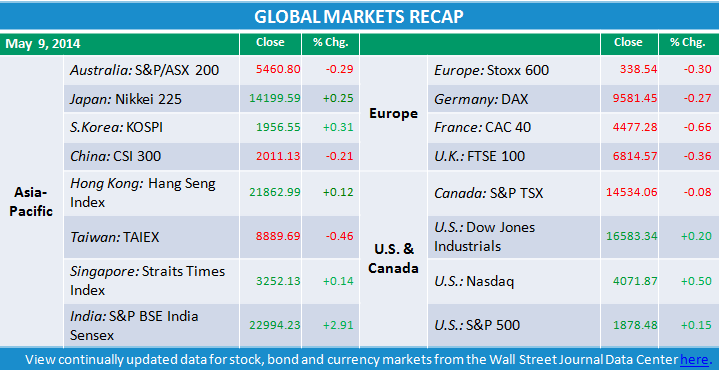Ukraine crisis a theme for this week's economic data The crisis and referendum in Ukraine may overshadow this week's latest batch of global economic data, with price and retail figures in the U.S., a Chinese factory output report, and economic growth numbers in the eurozone and Germany on the agenda. Weakly recovering Europe is regarded as particularly vulnerable. "An escalation of the Ukraine crisis might be the trigger which leads to a correction and can bring uncertainty back to the rest of the world," said ING economist Carsten Brzeski. Reuters (5/11) Clashes, political maneuvering further roil Thailand Thai protesters attempting to force out the remainder of ousted Prime Minister Yingluck Shinawatra's government clashed with police, and the Thai Senate elected a new president in a further move seen as undermining the government. The developments added to the constitutional confusion that is now a component of the protests that began in November, pitting the nation's pro-Shinawatra majority against the middle class and royalists. The Wall Street Journal (tiered subscription model) (5/9), Reuters (5/11) China central bank chief tamps down stimulus speculation The head of China's central bank cautioned against reading too much into short-term economic data and played down the prospect of large stimulus measures. Zhou Xiaochuan acknowledged changes in the nation's economy but said, "Looking at current economic conditions, the State Council has highlighted the need to hold policy steady. So we won't undertake any 'major stimulus' easily." Market News International (5/10) China inflation eases to 1.8%, raising deflation speculation China's 1.8% consumer inflation rate measured in April is about half the 3.5% target set by Beijing and down from the 2.4% rate in March, with some analysts expressing concern over the possibility of deflation. "As food prices remain subdued in the coming months and money supply growth slows, we cannot see any factor that would pull inflation higher in the coming months," said Chen Hufei, an economist with Bank of Communications. China Daily (Beijing) (5/10) U.S. Fed is expected to retain reverse repos The U.S. Federal Reserve is likely to adopt a short-term experimental tool for controlling short-term rates as long-term policy, Atlanta Fed President Dennis Lockhart said. Reverse repos, which allow financial firms to place cash with the Fed in exchange for an overnight loan of U.S. Treasurys, are likely to be "among our tool bag and therefore may very well have a role in how we try to influence short-term interest rates," Lockhart said in Dubai. Bloomberg (5/11) Drop in exports thins German trade surplus Germany's trade surplus in March narrowed to €14.8 billion from €15.7 billion in February as exports fell by the largest amount in nearly a year. The German Federal Economy Ministry said the situation could worsen in light of ongoing unrest in Ukraine. Xinhuanet.com (China) (5/9) Banks' reliable trading regime seen as firmly in the past The pre-crisis trading mainstays for U.S. and European banks -- fixed income, currencies and commodities -- are not likely to regain that status anytime soon, analysts say. They cite a tougher regulatory climate and a possible turning point in the 20-year string of falling interest rates worldwide. "The world has changed from 2007, 2008. The regulatory aspect is the biggest aspect," said Grant Peterkin of Lombard Odier in Geneva. Reuters (5/11)  |
The theme of the conference is 'Income, Growth and Alpha' and you can learn more about the agenda and speakers here.
CFA® members entitled to 20% discount. Register here using promo codes of 'CFA_II' for institutional investors and 'CFA_NII' for non-institutional investors. | | | | |  | | (SmartBrief) | | China institute points to shadow-banking links that could lead to crisis The Institute of Finance and Banking at the Chinese Academy of Social Sciences identifies the interbank market as the key link that could spread the risk of shadow banking from the money market to the real economy and ignite a financial crisis. "As the interbank business is expanding quickly, financial risks become more contagious within the banking system," the institute said. "Regulators should attach great importance to the supervision of interbank business." China Daily (Beijing) (5/10) Former SEBI member challenges inquiry An investigation into allegations of irregularities associated with the Securities and Exchange Board of India's granting of sanction to the MCX Stock Exchange in 2008 has been called into question. Former SEBI member K.M. Abraham doubts the Central Bureau of Investigation's authority to look into the regulator's decision process. The Hindu (India) (5/10) National Australia Bank denies any link to insider trading The National Australia Bank fired an employee under investigation for insider trading and denies that any bank funds were involved in the contested transactions, which it says had nothing to do with the employee's work at the bank. Lukas Kamay is suspected of insider trading in collusion with a friend at the Australian Bureau of Statistics in front-running currency trades. The Sydney Morning Herald (Australia) (5/10) | | Economic Trends & Outlook | Bank of Korea keeps rates steady but remains watchful Despite evidence of sliding consumer demand after last month's ferry disaster, the Bank of Korea left interest rates unchanged. However, the central bank said it would be watching domestic spending closely. Separately, the Hyundai Research Institute said South Korea's foreign exchange reserves of US$355.8 billion as of last month are short of the minimum US$380.4 billion needed to weather an economic crisis. MK.co.kr (South Korea) (5/11), MK.co.kr (South Korea) (5/9) China sets up new premier financial think tank China's central bank and three regulatory agencies have joined to set up a new financial think tank. The institute will be operated by the PBC School of Finance under Tsinghua University and is intended to become the leading organization of its kind as the country proceeds with economic restructuring. Xinhuanet.com (China) (5/11) Australia central bank ups growth outlook, indicates steady low rates Australia's central bank boosted its estimate for the nation's growth this year to 3% from the previous 2.75% but pointed to extended low interest rates. "Evidence of the effects of the substantial degree of stimulus already imparted has continued to accumulate," the bank said, but it noted that "the economy continues to face some significant headwinds, with the large decline in resources sector capital spending getting under way and fiscal consolidation in prospect." The Sydney Morning Herald (Australia) (5/10) S&P upgrades Philippines Standard & Poor's upgraded the Philippines' credit score to BBB from BBB-, both with a stable outlook, and markets on Friday reacted with substantial gains, as did the peso. S&P cited "ongoing reforms to address shortcomings in structural, administrative, institutional, and governance areas" that the agency expects to continue beyond the current administration. Business World (Philippines) (5/9) | | Capital Markets & Financial Products | With exit polls due this week, India stocks may be in for wild ride This week is likely to see major movement in India's market as exit polls from elections give a snapshot of the expected outcome, analysts say. Stock market indexes touched record highs Friday. But even so, "most cyclical sectors are still trading well below their average valuations, and in a longer economic upturn scenario, valuations still leave enough room for healthy upsides as GDP growth and consequently earnings growth in cyclical sectors continues to improve," said Dinesh Thakkar, chairman and managing director of Angel Broking. Business Standard (India)/Indo-Asian News Service (5/11) | Please contact one of our specialists for advertising opportunities, editorial inquiries, job placements, or any other questions.
| Mailing Address:
SmartBrief, Inc.®, 555 11th ST NW, Suite 600, Washington, DC 20004 | | |





No comments:
Post a Comment